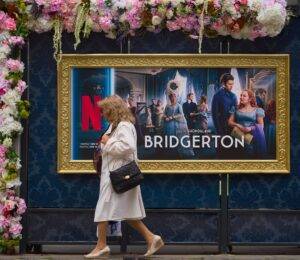Since its debut, the “Bridgerton” series has not only captivated audiences worldwide but has also provided a significant boost to the UK economy.
Netflix reports that the show’s “Bridgerton universe,” produced by Shondaland, has injected £275 million into the UK economy over the past five years.
Highlighting the franchise’s financial impact, Shonda Rhimes, Shondaland’s chief executive and producer of hits like “Grey’s Anatomy,” inaugurated trading at the London Stock Exchange last Friday to mark the launch of the second part of season three.
Rhimes emphasised the cultural resonance of “Bridgerton,” noting its influence on trends, baby names, and even weddings. “The Bridgerton universe occupies a special space in culture, resonating with young and old alike, creating conversation, starting trends and influencing everything from baby names to weddings,” she said. She further highlighted that the show has boosted the UK economy by a quarter of a billion pounds, supporting thousands of jobs and businesses.
According to Netflix, the production has bolstered nearly 5,000 local businesses in the past five years. Rhimes underscored the economic significance of art and culture, stating that their impact extends to local communities.
Anna Mallett, Netflix’s vice-president of production for Europe, the Middle East, and Africa, echoed Rhimes’ sentiments. She highlighted the cultural and economic contributions of “Bridgerton,” affirming the UK as Netflix’s home and a central hub for their storytelling investments.
Netflix’s £275 million figure, calculated internally, encompasses both direct and indirect spending, including production expenses. This positive news arrives amidst a challenging period for UK film and TV studios, which are seeing job cuts as the post-pandemic streaming boom declines.
London Stock Exchange CEO Julia Hoggett, while not necessarily a “Bridgerton” fan, expressed her excitement at celebrating the economic and cultural impacts of the UK’s film and creative industries.
The £275 million estimate excludes revenue from related activities such as themed events, merchandise, and tourism, suggesting that the actual economic impact may be even higher. Iconic locations like Castle Howard in Yorkshire and Ranger’s House in Greenwich have likely seen increased tourist visits thanks to the show.
The series has sparked numerous trends, including the “Regencycore” aesthetic, which remains popular. A recent Pinterest report highlighted the “Bridgerton tea party” as a top trend, with searches up 430% in April compared to the previous year. Creative tea recipes and floral decor ideas are trending as people seek inspiration for hosting themed events.
High street stores like Liberty are embracing the “Regencycore” trend with immersive pop-ups and dedicated fabric collections. The show’s influence extends into interior design, with DIY panelling and period-inspired decor becoming fashionable.
“Bridgerton” has also impacted beauty trends, with Cult Beauty noting a rise in “defiant romance” looks featuring blush cheeks and faux freckles. Home improvement retailer Eurocell reported increased searches for wisteria plants, pergolas, water fountains, and outdoor candles, reflecting the show’s lush garden aesthetics.
Beth Boulton, marketing director at Eurocell, noted that “Bridgerton” has inspired a gardening trend characterised by abundant plants and vibrant climbing flowers, adding a sense of wonder to outdoor spaces.
Read more:
‘Bridgerton Effect’ Adds £275 Million to UK Economy, Says Netflix

